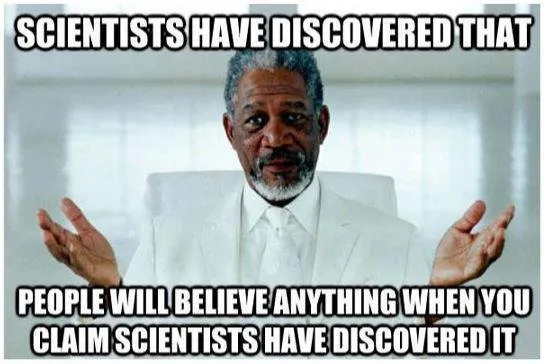On July 14, 2015 Stav Atir published a study that demonstrated how know-it-all douchebags — from marketing specialists, organic proponents and get-rich-fast schemers are actually more likely to fall for for made up bullshit facts themselves. Yeap, the biggest "experts" seem to get easily played and believe grandiose bullshit to begin with.
"Overclaiming" as it came to be known, is the false perception of people that seem to believe how the world works and how much they know about it. For example, someone might attend a couple of motivational speaking groups, get a college degree and work for a high-tier company and immediately believe that knowledge has magically landed upon them. As Bernard Russel discovered decades ago:

The study even demonstrated that this also evident in scientific fields such as biology where skepticism and humbleness should triumph. Even if participants in the studies were warned that some concepts were fictitious it did not reduce the overclaiming effect..
What this implies is that humans are easily caught up in their own whirl of limited perception. The focus in seeing the world through a narrow lens in their focus area due to how the world functions in regards to specialization. This disables them from stepping back and looking at the larger picture. More so, the nature of our economic system has individuals categorized based on their area of specialization. This creates an unlikely conundrum since people start comparing their knowledge to those around them instead of being able to reflect outside of their realm. Now don't take this study at hard because after all, it was produced from "experts". Hear me out though;
Wonder why bullshit inquiries like homeopathy, astrology, acupuncture, heck even astronomy, psychology and economics seem to be valued and perceived as 'sciences' that help us understand the world? What matters is not the bogus correlations that they are able to come up with. Rather, what really matters, is how well defended their claims are when it comes to real world applications. If enough "experts" support that the correlations hold then the masses follow.
People pop-up homeopathic pills (plain water) and believe in the whole thing because "experts" reassure them of the positive effects in at least 33% of the cases. They neglect though to include that, given enough time, the body self-heals most illnesses and that 33% is more or less the result of a placebo. Astrology does much the same. "Soon you will travel and meet someone that will change your life. Be wary though because a surprise visit might change things". Although there is an obvious "no-shit-Sherlock" element, as well as the power of suggestion roaming rampant in such a statement, people believe the "expert" in the field. They don't argue whether the "expert's" knowledge about the future based on astrology is valid but rather debate whether the knowledge is more valid in comparison to another "expert". Everybody forgets that the entire enquiry is based on thin air of "experts" that phenomenally jerking each other off in order to create an air of credibility in the field which they are making bank.
Psychology does much the same with "disorders". Nobody bothers to dismiss them completely. The point is always which "expert" is closer to the "answer". Which can it "help me"?. People got used of popping pills and having paid friends. The market is there. Psychology gains validity from people's needs. If enough people want a solution then the field investigating it, gains credibility because more and more people clump up and "experts" arise (even if its all bullshit).
Economists do much the same when it comes to economic policies. Everything changes so rapidly around us. Every economy is extremely fluid, fragile and unique on and in itself but they still insist that what worked before will work in the future. The "experts" fight to get their point across in order to push economic policies but we forget that it doesn't matter what they chose. If it works then the economist was right and everything worked according to plan. If it doesn't work then ...something else went wrong.
When an expert uses a post-hoc narrative aka explaining shit AFTER they occurred then you need to understand that they are "expert bullshiters", before they are anything else. This is why you see politicians or motivational speakers speak generically. Example: "There is nothing the mind can't accomplish if we put ourselves into it, but we have to careful with those around us". If everything goes well and you become successful then "fuck yeah, Tony called it bro, he is so legit, buy the book bro". If it doesn't "darn it, Tony warned me bro, I didn't listen, maybe I should read the other books". Tony, the "expert" is right no matter what morons end up believing. Most people luck basic critical thinking skills anyways.
I have yet to see a single "expert" predict in great detail something BEFORE it happened, explaining why and how it would happen. When it happens it is always a result of rigorous observation and careful experimentation. (And yes lucky calls count as much as lottery predictions). Expertise and experiment come from the same latin word 'expertus', which is the past participle of experiri ‘try’. This is how we also get "experience" and "experiment". Most "experts" have not tried over and over again like science dictates for experimentation. They merely propagate non-sense — hence the importance of replicability and falsifiability in the fields. No matter how much you love a field of "science" if your experiment has no replicability or falsifiability then it is mostly bullshit much like any kind of pseudoscience. Call it "soft science" heck, call it "jello science" if you want. It is still boloney. Unfortunately, most "experts" build their entire careers on nonsense since peer-review credibility and amount of publications seem to be valued more than replicability — aka confirming actual expertise.
As far as I can remember I always turned away from people that are either too popular or make extravagant claims about the world. I use it as a rule of thumb. If a group of people does X because they believe the "expert" that propagates it, I do the exact opposite. This has allowed me to get amazing financial rewards throughout the years and helped me to understand the world much better. "Expertise" is much like a bubble in the market. When too many people start claiming they know shit and more and more people get into it, then you know is time to back off. You know that is all over amplified hot air with no substance — hence the inevitable collapse
When I see people getting into STEM because science has become "cool" then I know I should be wary of the studies from newly "experts". When I see people popping pills for newly discovered "disorders" then I know that there is a lot of bullshit support from "experts". When I see everyone getting a house because "American dream fuck yeah" then I am wary of the economic "experts". When I see "everyone should get an education because education fuck yeah" while the student debt piles up, then I know that the "experts" are coning people either willingly or unwillingly into a hot air meme that is about to blow up.
Paying attention to the clustering of "experts" will make you understand the world better rather than following their findings. The world is not run by experts but rather the shadow of expertise.




